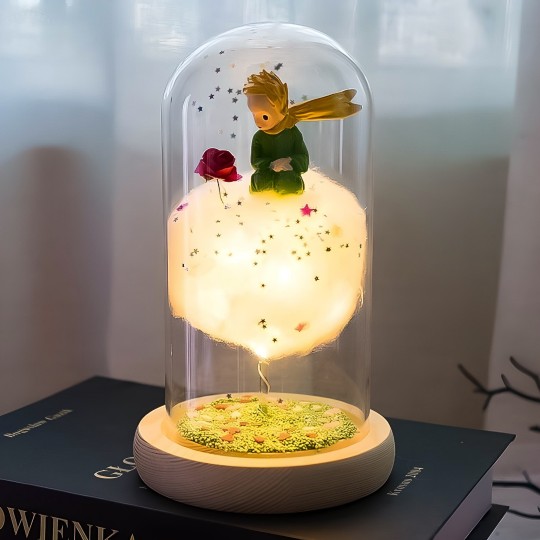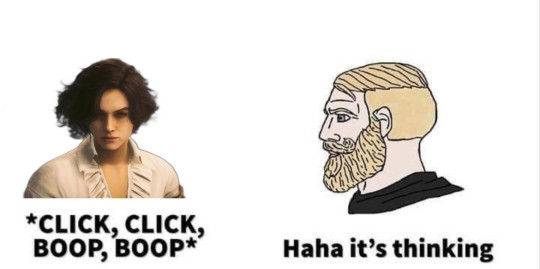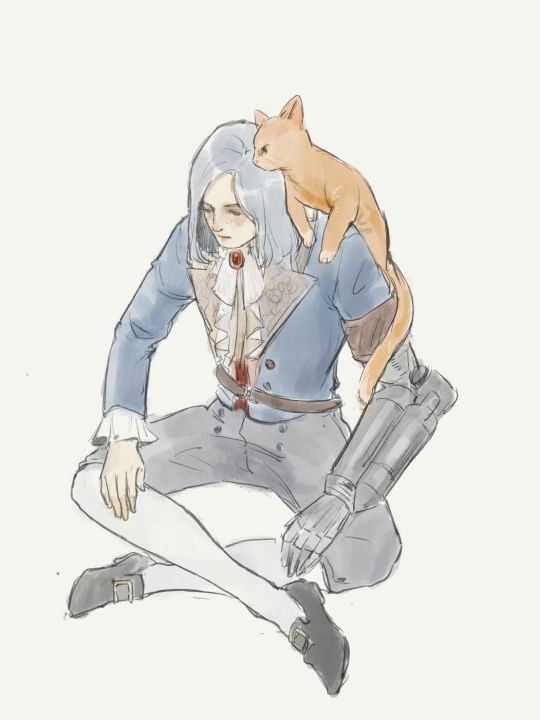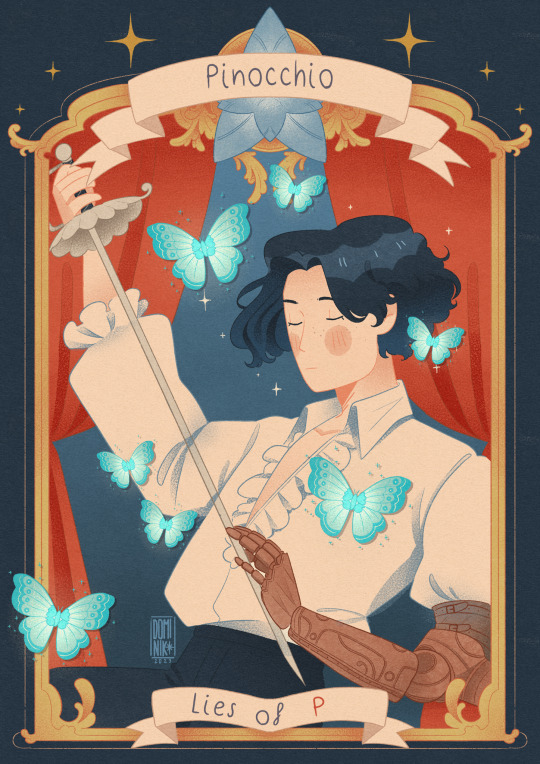Text
The major question of the story that we are now asking:
Why, exactly, does Carlo never "wake up"?
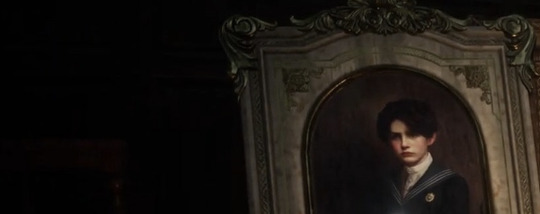
[long post]
[Spoilers ahead]
Well, simply put - Because he is dead.
OK, that seems like too obvious an answer, but I'll elaborate, and bear with me here. I want to recap some elements first so you know where I'm coming from, but I'm also trying not to completely explain everything because that's way too hard and would be too long.
[Currently, we don't understand everything about the story or its meaning. Because of some of the shrouded nature of the lore and narrative, it leaves much mystery. But from viewing these questions and the story from a thematic standpoint, something unexpected and really cool happened. I found that the story and the lore opened up in reverse.]
The easiest way to explain the plot (in my opinion):
It was my impression that Geppetto never “started” the puppet frenzy. The puppets were NEVER breaking the grand covenant, interpretably they are protecting humans by stopping the spread of the petrification disease, it’s just that everyone in the city was infected by that point.
Now with the puppets killing everybody in a city where everyone was infected (ergo being the result of the disease) Simon can go around harvesting all that ergo and Geppetto presumably plays him by letting Simon collect the Ergo first, and then sending P to kill him. [again, these details may not be completely accurate, but bear with me here]
Why create P in the first place?
He's made in Carlo's image so to speak because Geppetto hopes that Carlo's spirit will awaken. This is also why P is never bound to the covenant (it seems that not being bound to robot laws makes puppet egos awaken faster, since awakened puppets can break the grand covenant). So that is the two functions of P, to destroy puppets for ergo to harvest and so Carlo's consciousness can restore. I was just guessing that the arm of god was enough to get Carlo to revive, and Carlo's mental spirit reviving would be helpful but not entirely necessary. But for reasons we don't understand, Carlo never does regain consciousness.
Geppetto bitterly tells us that we don't seem to have inherited Carlo's memories. There is no big moment where Pinocchio or Pino or P reawakens, fully, as Carlo. He isn’t treated by the story as him. During the course of the game, P struggles to forge his own identity, to become a real boy, despite starting as a copy of the original. It’s a very fitting parable for the genre identity of a soulslike.
However, there are other successful re-incarnations of people through puppets, namely Sophia at the end of the Rise ending. We ask, for consistency's sake, why are puppet-form Romeo and puppet-form Sophia assumed to have retained their original identities, but not Pino? This is just my personal interpretation of why Carlo just couldn't or doesn't wake up. It isn't really based any lore or deduction from story details, this is from more of a philosophical point of view. And it isn't just the luck of the draw.
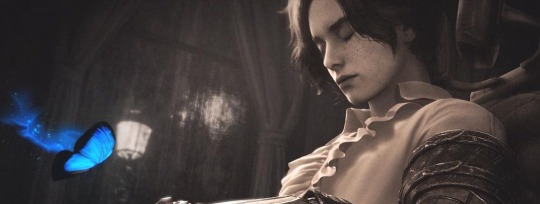
I had some initial thoughts about Carlo's failure. Romeo was made with intention of continuing to fight against the disease, as it's told that he "made a deal with the devil". Sophia may have been a special case, as she is a listener (Arlecchino even refers to her as the goddess in the tower), she may have had an ergo identity so strong that her essential self could retain this process. But either way, the implication is that Pino may have been able to recover her not long after that final fight. Look at the nameless puppet. The state of Carlo's body is so poor, that more than not his body seems to have been replaced with puppet parts. I think the implication was that Geppetto had been replacing parts as they rotted away. Maybe he had simply been dead for too long. But again, this isn't exactly why I think he couldn't awaken.
Simon and Geppetto
Lies has two main antagonists, although one isn't completely revealed until the last section. Both Simon and Geppetto are the perpetrators of Krat's destruction, but for what seems like different reasons. Simon is trying to be reborn, and Geppetto is trying to revive his dead son, Carlo. Interpretably, they are both trying to become Gods. Simon by grasping the supernatural, cosmic power of one, and Geppetto by raising the dead. They have destroyed Krat in their attempt to become a god, or more succinctly put, attempting to become God, singular. Geppetto's goal is, in essence, the same as Simon's goal - Because bringing back the dead would make him God.
That's why it seemed all so confusing. Haven't Geppetto and the alchemists already raised the dead, as Pino does at the end of the Rise ending with Sophia? Sophia, Romeo, and Carlo were all afflicted with the disease. Their Ergo were all made into puppets, but there's a minor but important distinction here. Sophia is still alive in her condition and actively suffering, this is the reason why she asks us to end her life. It seems as though Romeo lost his friend to the disease, and then made a "deal with the devil" to continue fighting, this implies being made into the king of puppets. We collected Sophia's ergo while she was alive, which we then used to animate the puppet. So the three of them were afflicted with the petrification disease. Sophia perished, Romeo perished, but Carlo died.
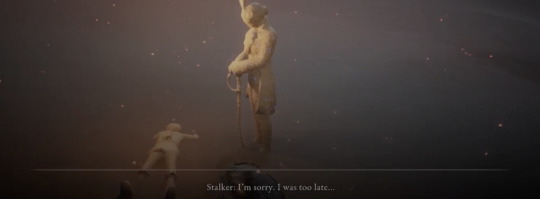
Now if we see the sand memories section of the beach, the stalker's words start to gain some clarity. If Carlo died from an incurable disease that the stalker couldn't prevent, why is she too late? Perhaps the goal was never to "save" Carlo's life. She laments; That she was too late, NOT to "save" him, but for him to be able to be restored. The stalker seemed to understand that whatever procedure needed to be done would be useless past the point of death.
I have to admit that there was something that I thought could override my theory. It seems as though the alchemists already were able to bring back both Champion Victor and The Eldest of the BRB, and from the dead no less. We read from notes in the Grand Exhibition that Victor had caught the disease, died to the despair of his adoring fans, but then miraculously made a comeback somehow stronger than ever. But maybe - he had only appeared to be brought back from the dead to the public, as Victor sought the help of the alchemists. And when it comes to the Eldest in the coffin, I'm wondering if he was actually only mortally wounded, leading the brotherhood to consult with the alchemists. [The way he was carried out by his brothers too (shouldered on either side) isn't typically the way you would expect people would handle a dead person]
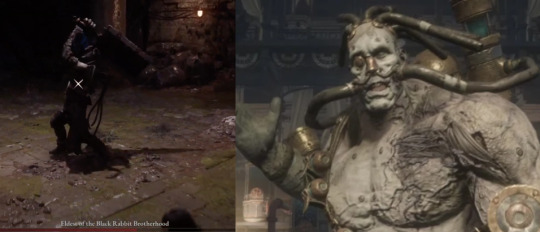
Mirroring Sophia, Romeo, and Pinocchio, who were made into puppets: There is Champion Victor, The Eldest, and Nameless Puppet. We can see the former three as Geppetto's method of "cheating" God (cheating Death), and the latter three as alchemists' method. Only "Carlo" has a form in either one - The Nameless Puppet and the player, P. The Nameless puppet appears to share a similar undead quality with Victor and The Eldest of the BRB (including the tubes). We know that the collected Ergo can animate puppets, They are puppeting around their own dead bodies.

I feel like the Nameless Puppet tells us in a poetic way that Carlo is gone. My thoughts on this are more abstract. Again, this isn't from a factual analysis, but more of from viewing the Nameless Puppet itself as a metaphor. The Nameless puppet has qualities similar to the other undead bosses, yet the game doesn't describe it like it does Victor and the Eldest. It's not a body. It is a puppet [Human on the outside, mechanical on the inside - the inverse of our protagonist]. And straight in the text, we are told this is "The Nameless Puppet". But we know who Carlo was. His name was Carlo. We split open its head, and there are only cold, mechanical parts, instead of what we in the modern world now regard as the very most essential self (the brain). Because there was nothing to recover, there is no one there. Carlo's spirit had long, long since departed the world.
We are also told through one of the game's narrative devices that the Nameless puppet was the first puppet fitted with the organ. Ostensibly, Carlo's body was being prepared for whatever procedure that needed to take place, but Carlo died before that could happen (perhaps thankfully), and Geppetto pushed forward with his plans anyway, perhaps past the point of no return.
There are two forms of revival and we represent one of them, as in, there was the puppet form of Carlo and the undead form of Carlo. Presumably, the undead form was incredibly destructive, and thus stored away; We are the second try for Carlo's rebirth, this time in the puppet form, but we cannot even wake up without the aid of Sophia.
Lies, God, and the Finality of Death
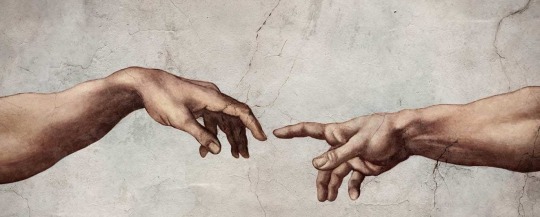
But doesn't Geppetto actually succeed in one of the endings? Simon fails to become a god, (well, presumably only because we kill him in the process of doing so) and then we confront Geppetto. If we hand over our heart, Geppetto actually does revive Carlo. We see the resurrected Carlo, but with one simple smile we realize this isn't the Carlo the game has been leading us to believe existed. This ending leaves us with distrust and unease rather than a sense of peace and resolution. Simon fails to become a god, and at the bad ending - even if he "wins" - the game makes us wonder if So does Geppetto. No matter what, Carlo could NEVER be truly, and in both senses of the word, honestly, be revived.
[Simon Manus - like Simon Magus, the biblical figure who tries to buy into the supernatural power of God. And Geppetto, of course alluding to the 1883 italian novel The Adventures of Pinocchio - a puppet master, a creator indeed, but of wooden imitations of life, and a poor imitation of God]
So, why I think Carlo could not wake up? Because whatever needed to happen could not be done after the actual point of death, and Sophia and Romeo's hearts were both transferred before they actually died. His spirit had long gone from this world. Krat has methods of eternal life, but these transfers happened while they were still alive. While the alchemists and Geppetto could certainly cheat death (as we maybe even would with modern day medicine), they could not defeat it. Carlo can no longer wake up, Carlo can never wake up again, because he is dead.
193 notes
·
View notes
Text
this game this game this game. I have been thinking about this.
The endings have such an ironic human expression attached to them.
The middle, neutral ending is just that, a hollow and neutral victory. There is no expression tied to it.
In the worst ending, where we remain as a puppet - albeit one of flesh and blood - He smiles at the end, an expression of joy. But in the "good" ending, in the most interpretably "good" ending you can possibly get in the game, that expression is a tear. An expression of sorrow.

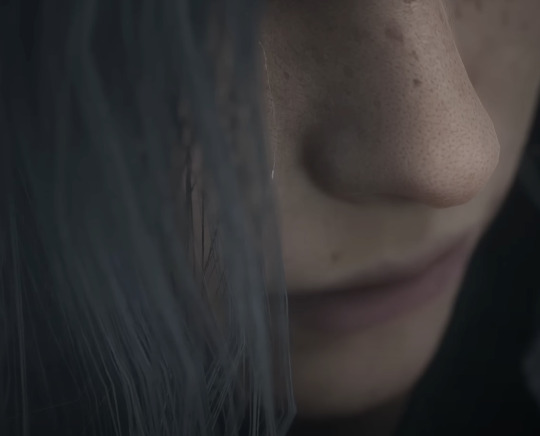
Maybe this is drawing from Collodi-esque ideas. As though telling us that it isn't the ability to experience happiness that makes us human; It is the ability to experience pain.
[And both of their skin is speckled and "flawed" in either ending. But in the good ending, his skin is "flawed" in the FAR more human way]
I don't have any smashing conclusions right now, I just thought they were juxtapositions in the story that were super interesting. And so beautiful.
There aren't really any "happy" endings in the game (in true k-media fashion). All of them are sort of melancholic, in my point of view. Krat is still totally destroyed, and either our father dies or the entire hotel, no matter what we do.
It's also reminding me of this verse:
Oh, we don't own our heavens now
We only own our hell
and if you don't know that by now
then you don't know me that well
Buy the Stars - MARINA
As in, we cannot own what makes us happy. We can only ever own what makes us sad. Maybe that doesn't make sense, but I've been wondering about those verses since the song came out.
#lies of p#LOP#spoilers#lies of p spoilers#theory#this game this game makes my hands shake ;_;#liesofp#What do you guys think?#Does Love = pain?#he's crying in the good ending and smiling in the bad one
166 notes
·
View notes
Text
some notes and random LoP thoughts, on the follow up to this write up:
[again, these are just my thoughts! that's the beautiful thing about art. I think all your guyses interpretations are valid.]
1.
I don't think the pinocchio story as we know it exists in-game. It's there just as a little easter egg and nod to the original story for us, and the actual book in Krat is a similar story about a wooden marionette. Biggest reason is that our dad IS literally named geppetto, it doesn't really make sense that this fictional fairy tale in-universe would have so much in common with the "real" environment of Krat. HOWEVER, Simon does refers to sophia as "our blue fairy" which might be him alluding to the same book!
2.
I DO think Carlo comes back to life in the real boy ending. (there's speculation that it's just the nameless puppet masquerading as Carlo.. which is also so beautiful and tragic.)
I think we had sophia and simon as a parallel to the central relationship of P and Geppetto - Sophia is kept alive against her own wishes; we set ourselves free in setting her free. But while Simon is trying to become a god at the top of the tower, we go to the bottom of the tower to see a man who has done the exact same things but for different reasons. Geppetto has all that strife to resurrect just ONE little boy.
It was a VAST amount of ergo and the arm of god they used. But given that geppetto still has the glove thing, and the messages of the game's theme, I think the implication is that he likely still has the glove. I think Carlo physically cannot defy his father, emotionally or otherwise.
3.
There are some varying thoughts on whether or not Pinocchio survives in the end of the "Rise" ending. I totally believe Pino is still alive regardless, but I don't really count revisiting the hotel after the ending as proof that Pino is still alive; it's hard to explain. (When the game first came out I was CONVINCED that P was dead, and I've changed my mind since) I think revisiting the hotel after the credits roll is there because it's a video game function, and can be disregarded in favour of the story (like how P is carrying the Painting even if it disappears, etc.). but again, I think Pino is still alive regardless.
17 notes
·
View notes
Text



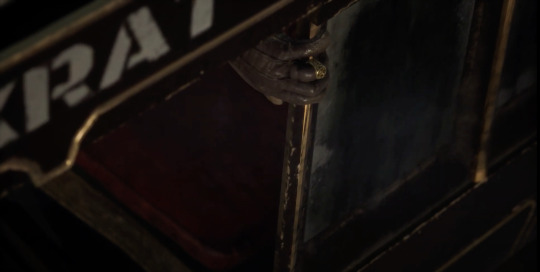

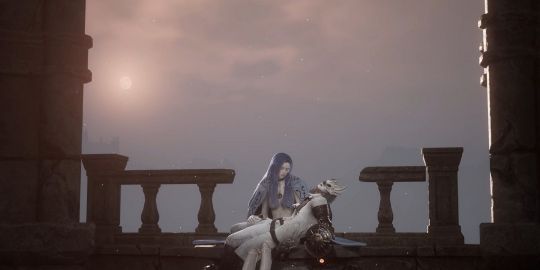

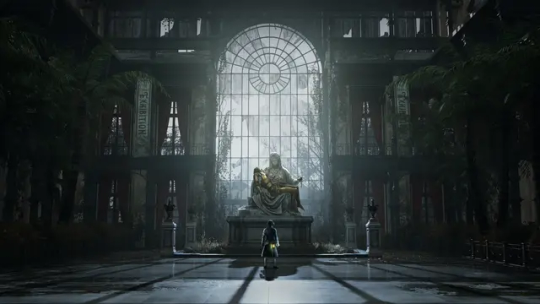
This one's black and white,
a no or a yes.
Is Geppetto's creation a killer?
Confess.
Lies + cinematic parallels
#lies of p#LOP#spoilers#tw blood#lies of p spoilers#did not see those father + son connections at first#;_;#why was this game so good.#how did they do it.
60 notes
·
View notes
Text
On the "original" korean script
its pretty certain that LoP has been a smash hit, i really hope they go back and do a korean dub
I REALLY WANT TO SHARE THIS. i fell down the translation rabbit hole after looking for a specific translated version of pinocchio
so, Carlo is way franker in the original korean version.
taking this really important line in the game. In english, the line was translated to
"I don't care if an old man like that kicks the bucket!"
I feel like it's way harsher in the original korean. in korean it was
"그깟 늙은이, 죽어도 상관 안 해"
which to me is more like "That old geezer, he can die for all I care." (literal translation would be like.. "That oldie, don't care even if he dies") In korean it's not so much a one to one translation as it is different conjugations and grammar depending on respect and the speaker. he doesn't literally call him an "old shit" but "그깟 늙은이" is let's say, carlo being very flippant
(if there are any korean speakers, yall are probably better than me, if you can refute or confirm this plz lmk)!!
ALSO: I went and I checked the Riddler's phone calls and they do also rhyme in korean!!? imagine adapting all that!! That is such the translation feat!!
more translation notes:
Geppetto: In my own way, I grew to love you.
After all, you're the puppet that would bring my son back to life.
The line in korean strikes me as more tragic.
"하지만 알아 다오, 나는 너도 사랑했단다.
내 아들 카를로를 되살려줄 인형으로"
eng (interpretation mine +google translate):
"But know this, I loved you too.
(as) You're the doll that would bring my son Carlo back to life."
(or save my son Carlo) confirming that geppetto did love Pino. just not enough.
그래도 부모는 자식을 기다려 주게 마련이지.
너같이 매를들어야 할 말썽꾸러기라도 말이다.
"Still, parents are bound to wait for their children.
Even if it’s a troublemaker like you who deserves a beating."
in the english version, it was:
"Still, a father always looks after his children.
Even naughty ones like you who deserve to be punished."
I think the english localization team took their own interpretation to adapt the story which is really cool to see. Like Geppetto keeps calling us his "good boy", there's no real equivalent to that in korean perhaps, but it's infantilizing and uncomfortable to an english audience (Pino may be young, but he's still a far cry from what we would call a "child"). plus there's that added BioShock inference for good measure
네 자유는 널 위한 게 아니다, 인형!
Your freedom is not for you, puppet! (no mention of carlo)
in the english release, it was
Your freedom is not for you, but for Carlo!
interestingly, there is no mention of carlo in the korean version at some points where the english version mentions him, and sometimes Carlo is mentioned in the korean lines when the english version omits this.
also, there is no difference between "doll" and "puppet" in korean as it is in english (as far as I know), and they use the word 인형 in the game where it was translated to "puppet" (when it would be generally translated to "doll"). In english, a "doll" indicates a toy generally for young children, while a puppet denotes a figure or figurine that is manipulated by a puppeteer. I really like that, it makes the setting even more story-book like
another note, carlo calling geppetto "old-ass" suggests that geppetto had him in his old age. In english "old man" is often an affectionate term for your father, so there's a difference there. in korean, i think carlo is simply insulting him LOL
[last of all, this is all just assuming that the script was originally in korean to begin with. ]
148 notes
·
View notes
Text
I feel like the LOP fanbase has many italians!! (hi all) and koreans. (It's like an italian-korean fanbase and i love to see it)
i think the italian fanbase would have read pinocchio in the native italian, so maybe they think its funny that i have a particular preference for a certain translation of the book. I prefer this specific translated version I grew up reading, and I can tell that some of the versions online aren't the same one! i'm sure they're great as translation is hard to do, but it's almost as if it's not the same book to me.
When it comes to The Little Prince (saint-exupery), the Katherine Woods translation is considered the definitive version in the english speaking world. Lines like "I am concerned with matters of consequence" and "If you please, draw me a sheep" - those specific phrasings are all iconic lines that have long been cemented into the "Little Prince" collective conciousness, and while many other translations have been made, it's Katherine Woods' version that remains the most enduring since the book has been published. Translation is an art in itself, and there's some that would even say that no other text captures the spirit of the original than the simple, almost naïvely rendered Katherine Woods edition.
I shouldn't be gate keep-y, but I would really recommend you all experience Pinocchio with the older translated version of the text. or maybe i'm just being an boomer!
here is an interesting article a little about the versions!!
and i love that they do mention The Little Prince here. (It is tied for second place)!! it feels like the oddest coincidence that i've become enamored with both. they talk about different adaptations too and i'm a little sad that they don't mention Lies of P at all, I feel like pinocchio enthusiasts wouldve liked it ahh!!
3 notes
·
View notes
Text
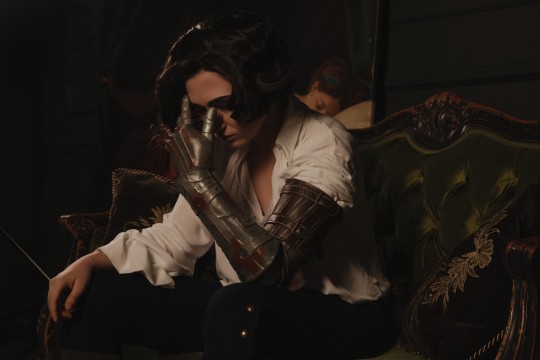
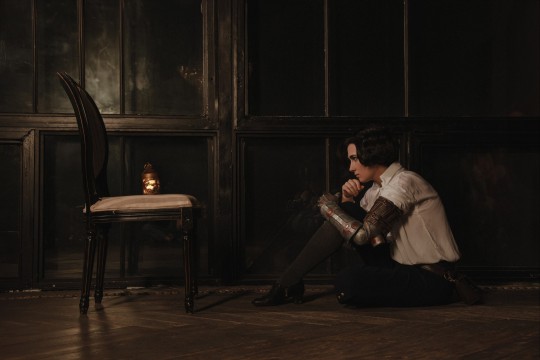
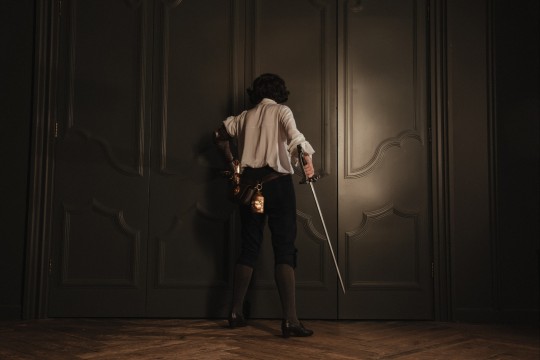

Photo: Shinori
Mua: Eva Romanova
92 notes
·
View notes
Text
I’m also surprised that they adapted a seemingly even more minor character (Eugene) into a more significant role. I wonder if this is because the devs interpreted Lampwick (romeo) character as an antagonist in the story. He does lead Pinocchio astray, after all.
in lies of p, i’m honestly surprised that they haven’t mentioned lampwick whatsoever, not even as a portrait the team has posted with the other characters or in the demo and even the trailers. it’s kinda interesting cause lampwick is known to be an integral character in the franchise – he’s pinocchio’s best friend, ( or at the very least, an ally who’s rough and deviant ) and the reason why he ( pinocchio ) is known to be curious / rebellious / mischievous of everything around him
idk if they’re keeping him a secret or what, but if they just…adapted him out or keep him as a mere minor character or npc, i’d be kinda disappointed :/
19 notes
·
View notes
Text
The game hammers in how important it is to know that a puppet cannot lie. The game is called Lies of P.
No. I don't think Lies of P stands for Lies of Pinocchio... I think the P... stands for Puppet. As in... The Lies of a Puppet.
This might be wrong, but I feel like it truly might be right... Considering Pinocchio is a real, actual story in the game of Lies of P (Carlo's favorite story, only referenced as "The story of the wooden puppet")... I have a feeling we're not supposed to refer to our puppet boy as Pinocchio.

The whole reason Geppetto (In the story Pinocchio) calls him this is because he was made of wood-- pine wood to be exact. Our puppet boy isn't wood. He's mechanical. The name Pinocchio just wouldn't fit.
By the end of the true ending, and when you get max humanity... you get the notification of "Your Heart is beating", instead of the other notifications ("Your springs are reacting" "Your ergo is whispering" "You feel warmth"). By all intents... you become human. You become Carlo, reborn in a sense, carrying both his heart and his memories. You become the living memory of him.
So... I feel like truly, by the end of it. We're just... Carlo. A version of him that's now lived on in a new way. Different in some ways, bearing new burdens and coming to terms with both new and past traumas... but ultimately, the same person.
Honestly, I really think we just-- awaken as Carlo again. And while I could get into the whole debate on whether it's TRULY Carlo or just like... an imitation (Like in the game Soma-- great game) for the sake of FANTASY and MAGIC and... ERGO lol I want to say it's him. He reawakens. He becomes himself again. And it's too late when people realize he's human and alive and himself again. The true version of himself. Not the obedient puppet who agrees with everything and never lies and always does as told.
Geppetto even says "Carlo always was mischievous" and "It seems you inherited his personality rather than his memories" or something to that affect (but we did inherit his memories. He see them unravel before us in the Black Seaside).
He's independent. he has his own choices. He relearns his own emotions. His own heart. He lives again and regains his own sense of self !!
That's just my take, though!
141 notes
·
View notes
Text
about that ending
on rise of p ending
i think its a very romantic scene but not in a literal sense
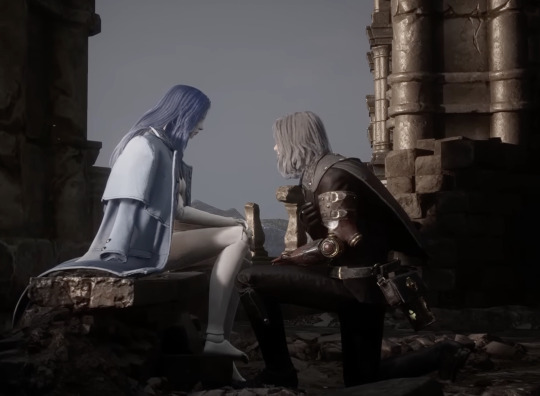
He has to fold one knee to reach her, the imagery is very marriage proposal-y
also sophe being naked, it is like her being reborn, but it's also sexualized, like showing their relationship is now adult and intimate. their relationship is now emotionally mature!! [And adulthood is innately tied to sexual maturity, perhaps inseparably. it is maybe THE idea of adulthood itself]
also of course sophe's hair now being freed and untied and loose (hairs really important in this game wow)
i dont think sophe and P have actual romantic leanings btw. it's more like it's symbolism/visual motif about him growing up and becoming an adult (a "real man" if you will)
like we've got the figurative ascension to humanity as well as the literal climb to the top of the alchemist tower. whereas when we started we were a naive puppet and practically every npc refers to us as a child
just thoughts, games beautiful, love it love it
#i feel like i have to keep talking about this game or IM GONNA EXPLODE!!!#lies of p#lop#liesofp#spoilers
26 notes
·
View notes
Text
Lies of P - ENDING EXPLAINED, THEMES & FAQ
MAJOR SPOILERS MAJOR SPOILERS
ENDING SPOILERS UNDER THE CUT
By the way, this is not a lore analysis at all, this is a discussion on the thematic ideas in the story, and I refer to the player character interchangeably as "we" or P/Pinocchio. This is also all just my personal interpretations on the story, and is subject to inaccuracy.
Please enjoy my spark notes-esque analysis on Pinocchio souls!!
Was Carlo evil?
My answer is no. This is a bit complex, so I’ll try to answer within two questions.
In one of the endings, P surrenders his heart and Geppetto then uses it to revive Carlo, his biological son. Carlo then ends up killing everyone in the hotel if we choose to "save" him. He steps out into the rain, looks at Geppetto, and smiles (something that P doesn’t do), seemingly confirming his newly found humanity.

This does seem like a happy ending at first, doesn't it? By submitting to him, We/Carlo may win the purely conditional love of our father, but this comes at a cost. He has surrendered a part of himself in obedience. He no longer has any agency. Thereby making him a puppet in the ideological sense:

The game has a meaningful mechanic where our hair will grow during the duration of the game. Carlo's presented with short hair, but he's also wearing the same outfit (white blouse) we had in the train station; This is the version of ourselves from the beginning of the game. Like showing all that development we made is now gone for submitting to our father, we're right back to where we started, even as a "real boy”: a non-realized being who is at the call of someone else, a (Gasp!) puppet.
Why does Geppetto sacrifice himself instead of calling the attack off?
Let’s say instead of giving away the heart, we refuse. Geppetto, disappointed, then opens the suitcase he’s been carrying since the first trailer. He reveals the unnamed puppet boss, raises up the unnamed puppet on strings, and attempts to take the heart by force.
If you survive the first phase of the fight, P is able to slice the top his head off. There's then an animation of the "strings" around the nameless puppet being cut, becoming more ethereal.
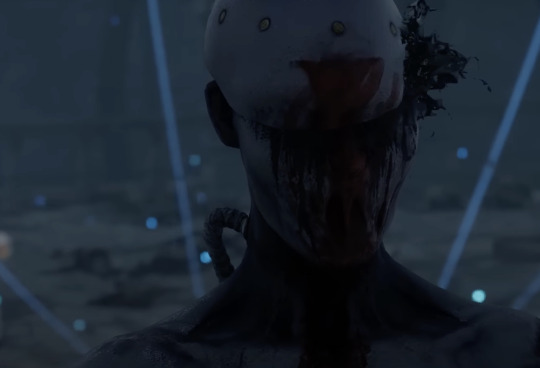
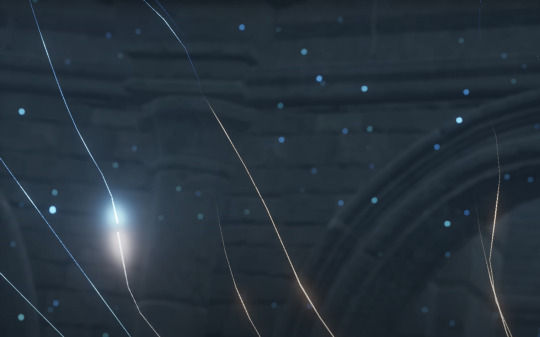
The fight goes on as it does, and then something strange happens. The nameless puppet seemingly defies Geppetto, and nonsensically attacks the heart Geppetto so needs in the first place, at which point he is so desperate for Carlo's revival that he dives in front of us.
Geppetto asks, shocked, "Were you trying to destroy Carlo's heart?"
What’s in the box?
Geppetto opens the suitcase we’ve seen him carrying since the first trailer, and raises up the nameless puppet. In the other ending, we can see that the body in the suitcase is indeed Carlo.

I think that Carlo/Nameless puppet regained some amount of sentience after being damaged. After the "real boy ending", Geppetto has him kill the rest of the people in Hotel Krat. Carlo being revived would mean Geppetto still has absolute control over his son.
Short answer: He lost control of the puppet in the second phase and it either sabotaged him or acted purely of its own accord to end the fight. I think the implication was that even Carlo knew being brought back was a bad idea. Damn :(
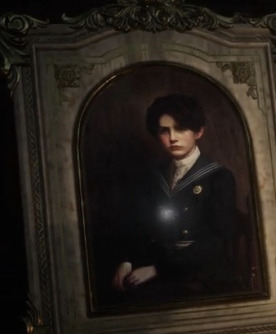
[note: people online have pointed out: It’s implied that Geppetto seems to have heavily neglected Carlo, and Carlo may have hated Geppetto in reality ("I don't care if an old man like that kicks the bucket!"). This reinforces the idea that the Carlo we see at the end is just a pawn.]
Is Pinocchio = Carlo?
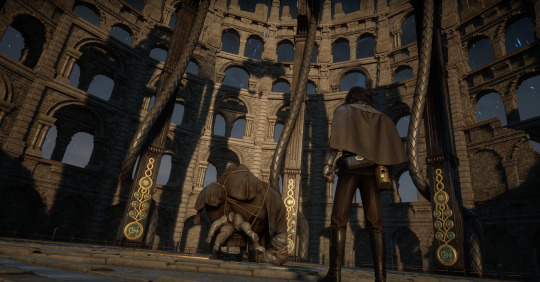
I think this is one of the more interesting points. This is either ambiguous or left unresolved by the game; but I think it's probably true that Pinocchio and Carlo are virtually the same person. If Geppetto had just accepted our/P's decision not to surrender the heart, he may have still gotten the son back that he always wanted anyway. But for all intents and purposes, the game seems to answer that it doesn't matter. Antonia's final letter to us rather profoundly chooses not to answer the question.
Why Antonia is a real one

This is Antonia's final message to us, contrasted with Geppetto's role with us as a parent in our final battle. [emphasis mine]
To the wonderful gentleman who gave my precious time back to me,
That time I met you was light itself.
Whether you're that child or not, I think you're a kind, precious child.
Thank you for giving my joy back to me in my last moments.
To the young gentleman who resembles Carlo,
Antonia Cerasani
[Remember, these are Antonia and Geppetto’s respective last words to us]
To be very fair, Geppetto was Carlo's actual parent; Antonia was not. But this seems to contrast with Geppetto asserting to us during the final boss sequence that we are just a puppet. The word "precious" is also very particular, as it's a word that Geppetto uses to refer to us near constantly ("Always remember that you're precious to me"/"it pains me to send someone so precious into such peril"). But while it could be read that we are only precious to him for ulterior reasons (because we carry the organ needed to revive Carlo), Antonia asserts that we are precious regardless. I see that as a truer, non-possessive love.
[also: Carlo's eyes are very noticeably brown (also seen in the painting), Our/P’s eyes are blue. Eyes, nearly always, have quite the symbolism! "The window to the soul", remember? While P and Carlo may have had a near-identical shell, I think this might be the game telling us that P and Carlo weren't truly the same. ]
Who’s a good boy?
Geppetto calls us "good boy" quite a lot. It's been fun watching various streams of this game, and whenever Geppetto calls us a "Good boy", I remember the chatroom filling up with messages of disgust, like: Good boy has real "Would you kindly" vibes! and: I squint my eyes at him every time he calls us a good boy like a dog.
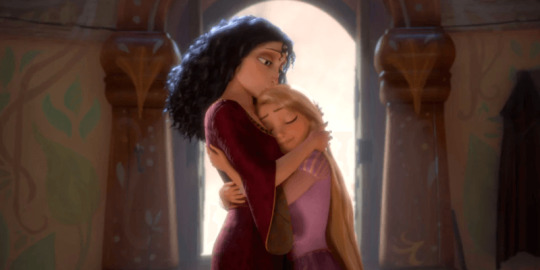
It really reminds me of Mother Gothel! When Mother Gothel calls Rapunzel "pet" and consistently dresses her in undersized dresses, she's infantilizing Rapunzel to take away her agency. Cleverly, each time she tells Rapunzel she loves her, she seems to be directing that love to her hair! She's also constantly touching and caressing it. She isn't interested in Rapunzel as a person, but in the functional idea of her. Geppetto also expresses discomfort seeing us age (our hair growing), in contrast to Sophia's honest and enthusiastic interest. It's symbolic of his disdain towards our growing self-autonomy (growth into an adult).
[Even in the last hug with P, it’s a basically a ruse to grab the heart, and he never gives P a second look when he collapses for dead on the floor.]
[To be somewhat sympathetic to Bad Dad Giuseppe (I'm not defending him), it's also probably because we are now growing past the age that Carlo died. Essentially, we're starting to outlive him, and Geppetto has to witness the growing that Carlo never got to reach. That's got to be hard to bear.]
What does P actually stand for?
P stands for Puppet, Not Pinocchio
People have noticed since the demo that we are never actually, explicitly referred to as "Pinocchio". The NPCs seem to dodge around saying "Pinocchio", opting for words “like Geppetto's puppet" or “child” instead. Given the story's inspiration and the game's title, however, it could be inferred that our name is Pinocchio. Why not just call us by name?
Well, the doylist interpretation is that maybe they just didn't want to stir up some kind of trademark trouble with a certain Walter Mouse. But the game does something clever with this, lore-wise. After our "betrayal" at the hands of our father, I think the big reveal is simply that we are unnamed. Giuseppe gave us no name, showing he didn't view us as a true autonomous being.

Why does Geppetto apologize in the alternate "good ending"?
Both the endings are near identical, but when Geppetto is beginning to curse Pino, he apologizes instead. The beginning of the end cutscene is the same as the second “good ending”, where Geppetto tells us that we’re “just a useless puppet”. He's beginning to say this, except for when he sees the tear fall, at which point he seems to relent.
I think it's supposed to imply, seeing Pinocchio seemingly mourning for him, that in the very last moment Geppetto understood that either 1. Pinocchio was truly Carlo or 2. that he was sentient enough to be his tangible son anyway.
Is Pinocchio still alive? (+ Collodi's journey to Adulthood)

I think so!
If you've taken certain paths, you unlock the third ending, which is like the second ending, except with an additional scene where we can see P returning to the Alchemist's tower to look at a peaceful Krat. P then uses the ergo from Sophia into a puppet replica, at which point he collapses, seemingly from exhaustion. Sophia cradles him as he sleeps and serenely tells us it's good to see us again.
In the book, Pinocchio, after travailing to support both his ailing father and the sick blue fairy, falls asleep and dreams that he is visited by the blue fairy. The fairy, now whole and healed, tells him he hasn't been the best son, but that boys who support their parents are "deserving of great praise". When he wakes, he is a human boy, and his puppet form lies lifeless on a chair. It isn't Pinocchio showing pure obedience that makes him into a real boy, but the selfless act of caring for his father (the reversal of the parent-child structure). In my interpretation - her final message is this: That he was never perfect, (and perhaps he would never be perfect), but the bottom line was that he loved his father, and that was enough to make him human. [I think there's something in my eye!]

(Easter - The Resurrection of Christ, Rebirth, Death and renewal, Spring)
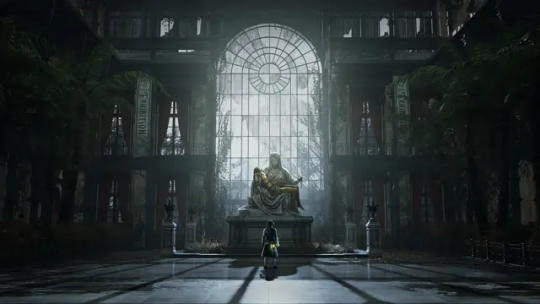
In case you don't know (I didn't btw), the statue in the Exhibition is actually Michelangelo's La Pieta. Its inclusion in the game not only alludes to the novel's Italian origins, but also serves as a central visual motif as it's representing Jesus's death in the arms of Mary. This visual motif is revisited by P and Sophia at the end of the game in the “true” (canonical) ending. Symbolically, In the selfless act of reviving Sophia and at the end of his journey, he has transcended and broken the "egg shell of his puppet body" into a true adult (a human being).
Does lying make us human?
At the centre of Collodi's Pinocchio is a father-son relationship wherein underlies an unconditional love. But this game has quite the different father-son relationship. When puppets are made, they are meant to follow under the laws of the Grand Covenant, and our father is the father of all puppets. Namely, each time we lie, this is in defiance of our father figure. Remember, the rule is that a puppet cannot lie. Lying doesn't have the connotation it has in the book or in popular culture adaptations of Pinocchio. Rather, lying in the game seems to infer choice and not deception.
It isn't just the act of disobedience (Self-agency) that gives us our autonomy ("A man chooses", mirroring Bioshock), In many cases in the story, we are asked if it’s better to comfort someone with a lie than telling them a truth that maybe wouldn’t serve them. In that way, you can also view lying as the selfless act of taking a burden.

Again, this adapts Collodi's psychological ideas in the book on the growth of the self-interested nature of the hedonistic, narcissistic child into the empathetic "adult" that works to serve others. [I know I might come across as harsh here, but bear with me, I’m just trying to speak in literary terms.] But while Collodi's Pinocchio focuses on the selfless nature of a parent, Lies of P focuses on the self-agency of an adult.
So why is Lies of P so dead serious about Pinocchio? Well, it's an elaborate metaphor for self-autonomy.
In Conclusion…
Does Lies of P have an identity issue in of itself? Great soulslike? PuppetBorne 2.0? But it's also a beautifully rendered Pinocchio adaption. Quite unusual, perhaps, but there's a quote that bizarrely enough comes to mind when I think of the audacity of a Pinocchio themed soulslike - Talent is hitting the target nobody else can hit, while genius is hitting the target nobody else can see. I think there is a reason why the tale of Pinocchio persists and persists.

138 notes
·
View notes
Photo
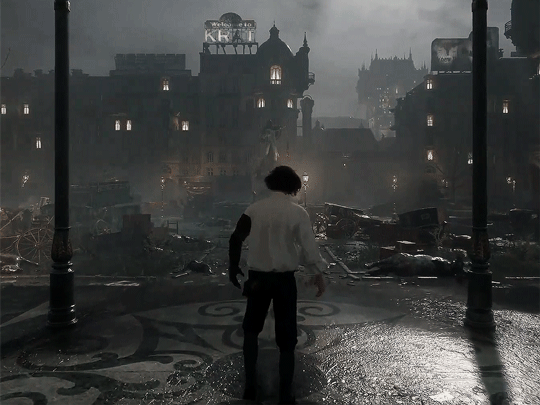
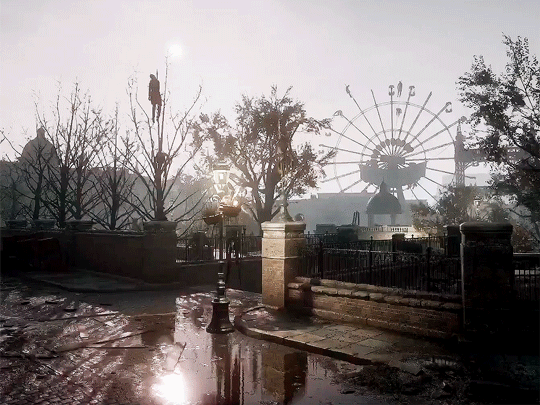
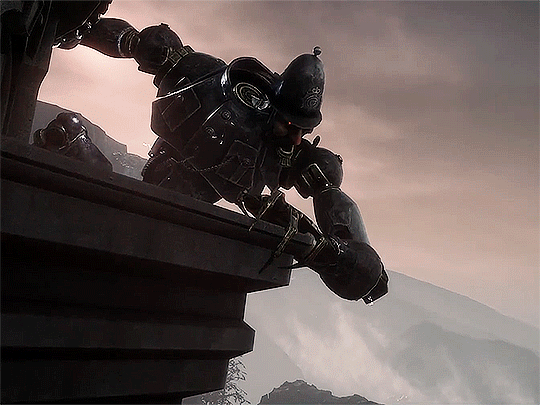
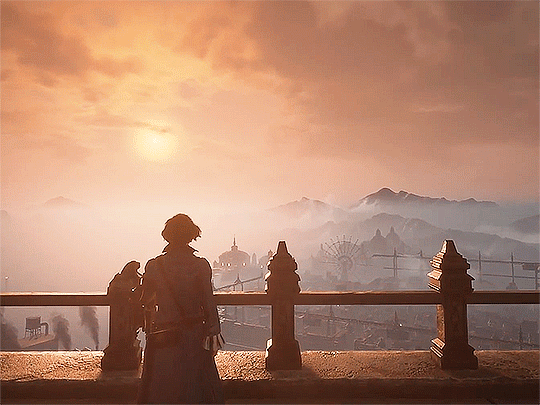
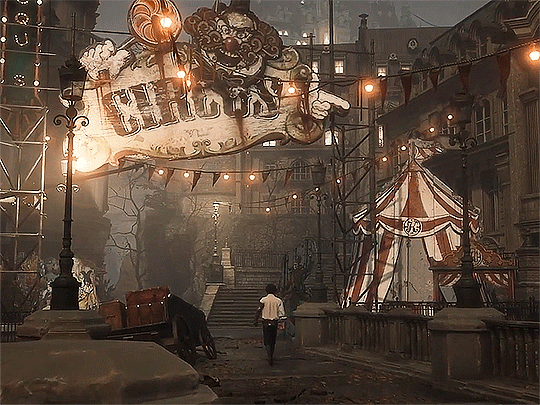
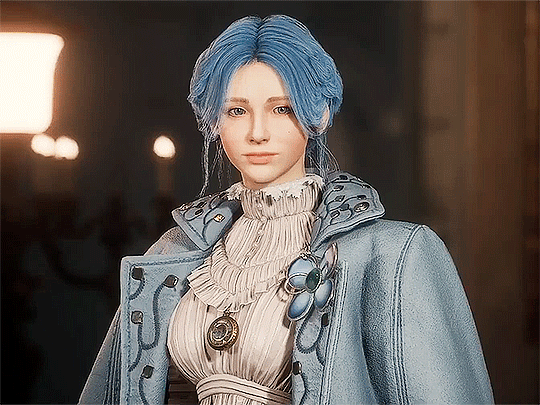
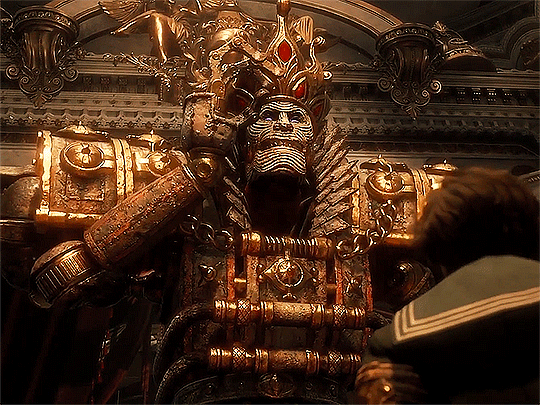
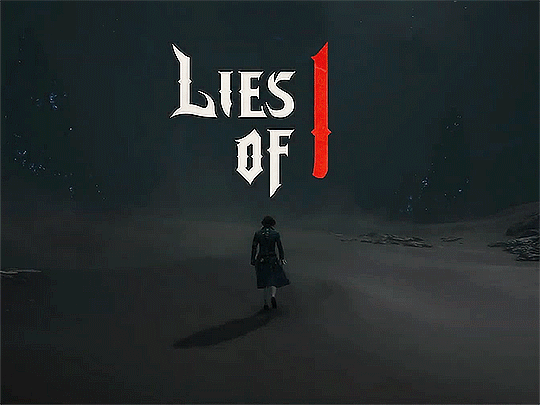
LIES OF P
September 19, 2023
2K notes
·
View notes
Text
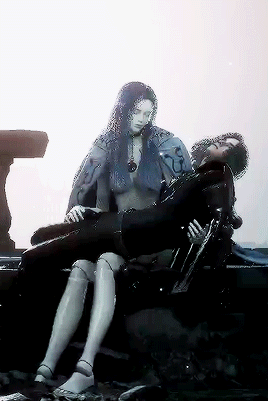
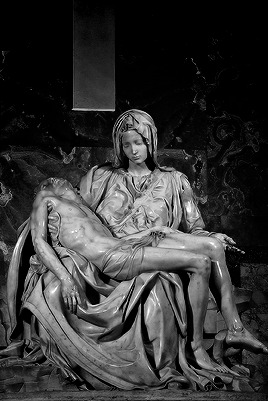
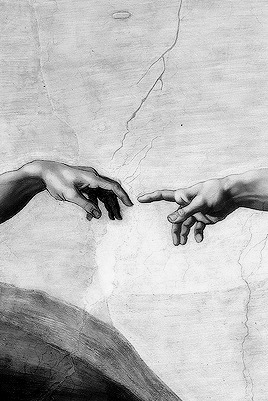
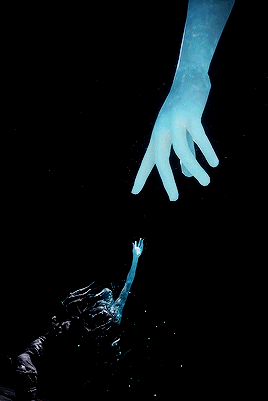
LIES OF P + art
1. Pietà by Michelangelo
2. The Creation of Adam by Michelangelo
1K notes
·
View notes
